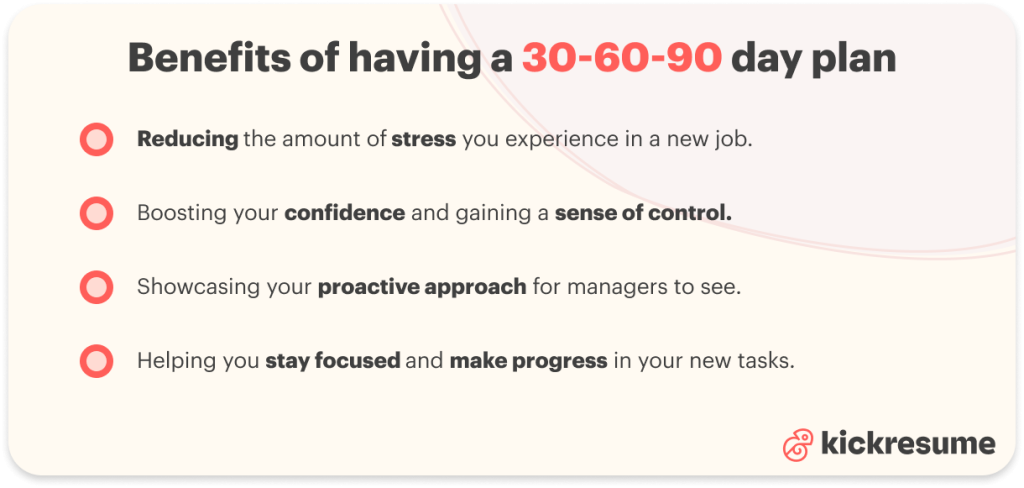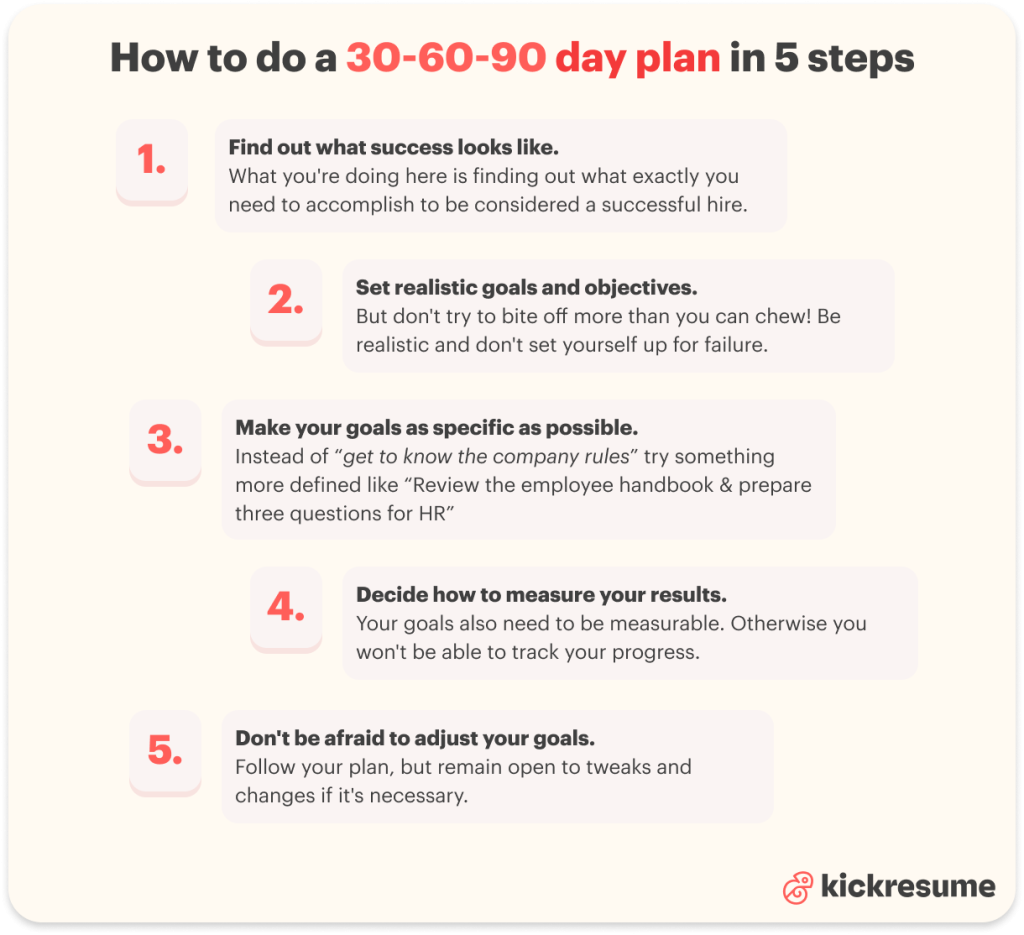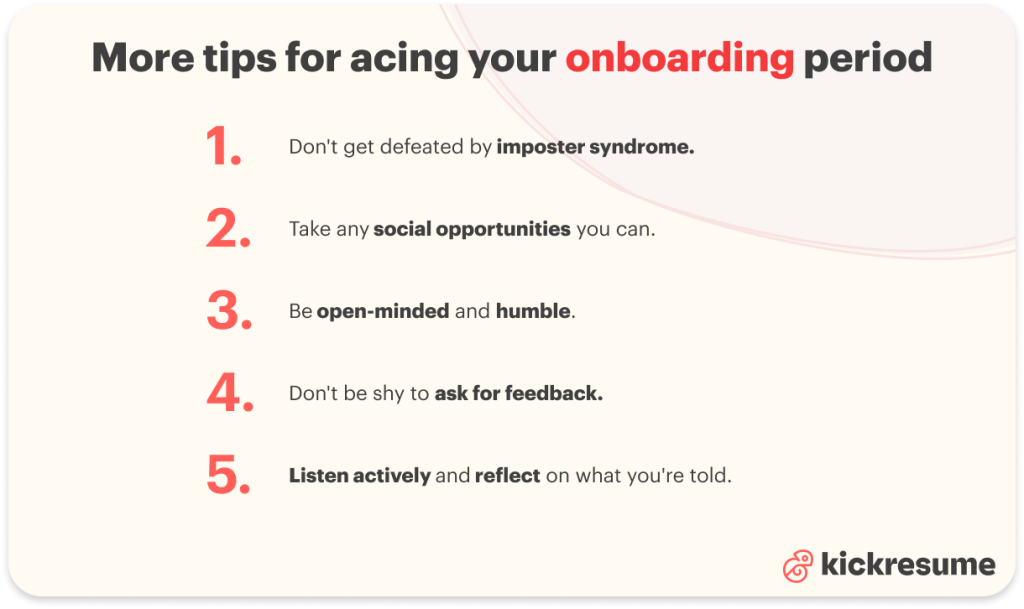When starting a new job, the first 3 months are crucial for setting the tone and proving your worth. That’s where a 30-60-90 day plan comes in, giving you a clear roadmap to navigate your new role confidently.
So, what’s a 30-60-90 day plan? It’s a simple strategy for your first three months, broken into phases:
- The first 30 days for learning,
- the next 30 for contributing,
- and the final 30 for taking the lead.
This way, you know exactly what to focus on and can show your new team you’re the right fit.
In this article, we’ll show you how to create your own 30-60-90 day plan, with tips and a handy template you can use right away.
What is a 30 60 90 day plan?
A 30-60-90 day plan is a document divided into three 30-day phases, guiding you on what to accomplish and focus on when starting a new job. It helps you map out your goals and actions for each stage, ensuring you stay organized and make a strong impact from day one.
Here's the thing — every job comes with its own set of expectations. Whether you're changing careers or starting your very first job, your supervisors want to see proof that they’ve made the right hire.
And that's when your 30-60-90 day plan comes in handy!
This simple document helps you make sense of what your first steps in a new workplace should be, which goals you should hit, and how to prioritize your tasks to meet expectations and succeed in your role.
Plus, it helps you break down your goals and tasks into three clear phases: the first 30 days, the next 60 days, and the final 90 days.
Let's look at what each 30 days entails:
The first 30 days
In the first month, your focus should be on getting oriented and learning the basics of your new role and company.
Here are the key areas to focus on:
- Understand the company. Get familiar with the company’s mission, values, and culture.
- Learn your role. Study your job description, expectations, and key responsibilities.
- Meet your team. Introduce yourself to your team members and understand their roles.
- Build relationships. Start developing connections with colleagues, managers, and stakeholders.
- Master workflows and tools. Learn about the workflows, tools, and systems you'll be using.
- Set up your accounts. Ensure you have all the necessary tools and access required for your role.
- Identify key goals. Discuss initial goals and priorities with your manager.
The next 30 days
In the second month, shift your focus to actively contributing to projects and integrating into the team.
Here are the important steps to take:
- Start small projects. Begin contributing to projects, applying what you've learned.
- Seek feedback. Regularly check in with your manager and colleagues to get feedback on your performance.
- Collaborate. Work closely with team members on tasks and projects.
- Track progress. Keep a record of your achievements and milestones.
- Attend meetings. Participate actively in team meetings and discussions.
- Adjust goals. Refine your goals based on feedback and initial experiences.
The last 30 days
By the time you reach the 90-day mark, you should feel completely settled into your new role. This phase is all about making a big impact and proving your worth. That's why, now, you should be able to:
- Hit key goals in your projects. You know what's expected of you, so go ahead and deliver!
- Find and make improvements in how things are done. You should also be able to spot room for potential improvements.
- Prove you’re a valuable team member. Finally, keep your head down, continue the good work, and leave no doubt that you’re here to stay.
Why having a 30-60-90 day plan is a must
So far, so good, right?
Well, if it isn't clear by now, creating a 30 60 90 day plan can help you in several ways.
Here are four of the most significant benefits:
- Reduces stress. During those first days you feel that everything is happening everywhere and all at once. But having a clear plan helps feel less overwhelmed and more in control.
- Increases confidence. Additionally, knowing exactly what you need to do and when to do it helps you feel more prepared. Just imagine cruising through your first months in the job without looking like a deer in headlights!
- Looking more proactive. For example, presenting your plan to your manager shows that you’re serious about your new duties.
- Staying focused. Instead of feeling lost or unsure about your next steps, you have a detailed outline of your goals and tasks for each phase. As a result, you'll be able to keep your eye on the ball at all times.
You know the saying, right? Fortune favors the prepared. And as you can see, investing your time into a quick 30-60-90 day plan is well worth the effort. Even Forbes thinks so!

How to do a 30 60 90 day plan in 5 steps
But the real question is: “How can I make my 30-60-90 day plan work?“.
Of course, every job position and every company has different expectations and cultures. So there isn't one single correct way to make your 30-60-90 day plan. You’ll always need to tailor it to fit your unique role and the specific dynamics of your new workplace.
Here's how you can make your 30-60-90 day plan in 5 simple steps:
- Find out what success looks like.
Remember, your 30-60-90 day plan isn’t just about you. In fact, its main objective is to help you and your boss agree on a common definition of success. So, what you're really doing is finding out what exactly you need to accomplish to be considered a successful hire.
- Set realistic goals and objectives.
Once you know what the endgame is, it's time to set realistic goals for each phase. But don't try to bite off more than you can chew! For example, don't put pressure on yourself to present ground-breaking ideas at meetings in the first 30 days of your tenure. Be realistic and don't set yourself up for failure.
- Make your goals as specific as possible.
For example, don't just add “get to know the company rules” to your list and be done with it. Instead, try something more defined — like “Review the employee handbook, particularly sections on workplace conduct and dress code, and prepare three questions for HR about specific policies." See the difference?
- Decide how to measure your results.
Besides being specific, your goals also need to be measurable. Otherwise you won't be able to track your progress. And that's the whole point of creating a plan in the first place, right? So, make sure to prepare an answer to: “How will I know that I've accomplished my goal?”.
- Don't be afraid to adjust your goals.
Finally, we recommend you to stay flexible. Of course, the ideal scenario would be making a 30-60-90 day plan and executing it flawlessly. But that almost never happens. Maybe two weeks into the job, you'll realize that the goal you set for yourself to accomplish by the end of your onboarding period isn't actually what you should be focusing on. Analyze, reassess, adjust!

When to make a 30 60 90 day plan?
Typically, there are two occasions where having a 30-60-90 day plan can make all the difference:
- At the start of your new job
- During a job interview
We've already talked about the benefits of planning out your first three months in a new job. But did you know that you can prepare a 30 60 90 day plan for interview as well?
Yes, that's right! Presenting a well-thought-out plan during your interview can set you apart from other candidates.
Just picture this: You're sitting across from a hiring manager who asks you “Imagine you get this job. What would be your first steps?”.
Now, the majority of your fellow candidates would probably answer this situational interview question in a way that's vague or generic. Simply because they weren't expecting it.
But you just take a deep breath and boom! Instead of stumbling over your words, you present them with a specific vision. Pretty effective, right?
Of course, the 30-60-90 day plan you prepare for a job interview won't be as informed as the one you'd create once you're in the actual work environment. But at this stage, that's not really the point.
30 60 90 day plan template free to copy & paste
If you're struggling to imagine what a good 30-60-90 day plan should look like, don't panic. We've prepared this free yet effective 30 60 90 day plan template that can help you organize your thoughts and goals.
All you need to do is copy and paste it into a word processor of your choice and adjust it to your needs.
30 60 90 day plan template
More tips for acing your onboarding period
Congrats! Now you have one more tool to help you manage the workload in your first three months at your new job.
But taking care of your daily tasks and duties isn't the only thing that makes your first 90 days successful:
- Don't get defeated by imposter syndrome. When you start a new job, it's common to feel like you don’t belong or worry that others might think you’re not good enough. That's imposter syndrome for you.
- Take any social opportunities you can. Socializing at work isn't just about making friends (though that’s a bonus!). It’s also about building connections that can help you professionally. Maybe there’s a lunch gathering or a team outing — go for it! It’s a chance to learn more about your colleagues and the company culture.
- Be open-minded. For example, if your team prefers a certain software for tracking tasks, be open to using it even if it’s new to you.
- Don't be shy to ask for feedback. Feedback is gold when you’re starting out! It helps you understand what you’re doing well and where you can improve. But don’t wait for your boss to give feedback — ask for it!
- Listen actively and reflect on what you're told. And when you’re in meetings or talking with coworkers, listen carefully to what they’re saying. Actively listening means not just hearing words but understanding the message behind them.

Key takeaways: 30 60 90 day plan
To sum it all up, having a well-thought out 30 60 90 day plan can be a real life-saver when you're entering a new workplace.
In short, it's a document detailing the results and goals you'd like to achieve in your first 30 days, the next 60 days, and the final 90 days of your probation period.
Before you start putting together a plan of your own, we recommend considering these 5 steps:
- Understand what success looks like in the eyes of your supervisors.
- Based on your understanding, set realistic goals and objectives.
- Break down your goals to specific steps that are relevant and manageable.
- To keep an eye on your progress, establish a clear way to measure your results.
- Follow your plan, but remain open to tweaks and changes if it's necessary.



